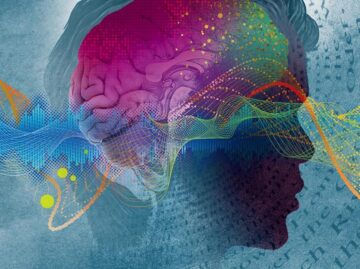Jonathan Shaw in Harvard Magazine:
 How does the brain process language—using sounds to form words, and assigning words their meaning? Recording the activity of single neurons in the language region of patients undergoing deep brain stimulation, researchers from Harvard Medical School, Massachusetts General Hospital, and MIT have been able for the first time to observe how semantic information is processed and represented by these cells during language comprehension. They’ve discovered that the brain uses contextual clues to decipher meaning, implying that understanding words and sentences is a dynamic, interpretive process.
How does the brain process language—using sounds to form words, and assigning words their meaning? Recording the activity of single neurons in the language region of patients undergoing deep brain stimulation, researchers from Harvard Medical School, Massachusetts General Hospital, and MIT have been able for the first time to observe how semantic information is processed and represented by these cells during language comprehension. They’ve discovered that the brain uses contextual clues to decipher meaning, implying that understanding words and sentences is a dynamic, interpretive process.
Using tiny electrodes with radio antennas, they recorded neural activity from about 300 cells as participants (receiving treatment for conditions such as Parkinson’s and essential tremor dystonia) listened to stories read aloud. By tracking these neurons’ activity during natural speech processing, the scientists observed that individual cells responded selectively to specific word meanings, and reliably distinguished words from nonwords. And they found that the neurons’ activities were dynamic, reflecting the words’ meanings based on their specific sentence contexts (“He picked the rose” versus “He finally rose,” for example), rather than responding to the words as fixed memory representations. They were even able to show how the activity of ensembles of these cells could be used to accurately predict the broad semantic categories of related words (such as “rat” and “mouse”) as they were heard in real time during speech.
More here.
Enjoying the content on 3QD? Help keep us going by donating now.
